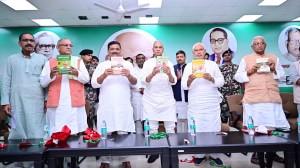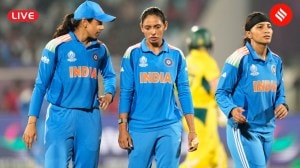Caste constant, cast variable in his politics, Udit Raj in a fresh row
Now in Congress, former BJP MP distances his party from his Murmu remarks, but insists that as Adivasi, she should speak for them
 Congress leader Udit raj (second from right) with Rahul Gandhi and Chhattisgarh CM Bhupesh Baghel during the Bharat Jodo Yatra. (Photo: Twitter/@Dr_Uditraj)
Congress leader Udit raj (second from right) with Rahul Gandhi and Chhattisgarh CM Bhupesh Baghel during the Bharat Jodo Yatra. (Photo: Twitter/@Dr_Uditraj)On November 4, 2001, Delhi witnessed one of the largest mass conversions of Dalits to Buddhism in contemporary history. It created a splash, and drew the attention and the fire of right-wing outfits such as the VHP, which petitioned the BJP-led NDA government to get the event cancelled. It was eventually denied permission for Ramlila Maidan and was held at Delhi’s Ambedkar Bhavan.
At the heart of the event was Ram Raj, an Indian Revenue Service officer from Uttar Pradesh, who had shot to limelight with the creation of the All India Confederation of SC/ST Organisations to oppose perceived attempts to dilute reservation in government services in the late ’90s.
He adopted the name ‘Udit’ that day in 2001, before embracing Buddhism along with his wife Seema, also an IRS officer, and two children.
In the period since, Udit Raj has changed several political partners but never left the headlines, often due to his provocative statements, mostly on the caste system. The latest being his statement regarding President Droupadi Murmu after she noted that since Gujarat produces more than 70% of India’s salt, “it can be said that sabhi deshwasi Gujarat ka namak khaate hain (technically meaning all Indians eat Gujarat’s salt but implying in its Hindi idiom that the country owes a debt of gratitude to the state)”.
My statement as regard to Draupadi Murmuji is mine & nothing to do with Congress.Her candidature & campaign were in the name adivasi, it doesn’t mean she is no longer adivasi. My heart cries that when SC/ST reach to higher position, they ditch their communities & become mum.
— Dr. Udit Raj (@Dr_Uditraj) October 6, 2022
Raj, who is now in the Congress, tweeted, “No county should get a President like Droupadi Murmu. Chamchagiri (sycophancy) also has its limits. She says 70 per cent people of the country eat Gujarat’s salt. If you survive on salt yourself, you will know.”
The BJP accused Raj of demeaning the status of the President, who is the first from the tribal community to hold the post. Raj subsequently issued a clarification, distancing the Congress from his remarks. “My statement as regard to Droupadi Murmuji is mine and nothing to do with Congress. Her candidature and campaign were in the name adivasi, it doesn’t mean she is no longer adivasi. My heart cries when SC/ST reach higher position, they ditch their communities and become mum,” he tweeted.
If there is one thing Raj, 64, swears by, it is this devotion to the “cause”. At the November 2001 conversion event, he had declared: “This moment is historic as thousands have decided to renounce the centuries-old Brahminical system… We have finally been ‘liberated’ from the clutches of the caste system.”
Raj had stopped short of announcing a formal plunge into politics. That moment came two years later, in November 2003, when he quit the IRS, while serving as an additional income tax commissioner, and launched the ‘Indian Justice Party (IJP)’, banking on his appeal among reserved category government employees as the national chairman of the All India Confederation of SC/ST Organisations, a post which he continued to hold.
In the 2012 Assembly elections in Uttar Pradesh, the IJP fielded as many as 150 candidates. Electoral success proved elusive, and all its candidates lost their deposits. Eventually, the IJP merged with the BJP in 2014, at the height of the Narendra Modi wave.
Between 2014 and 2019, Raj represented the BJP in Parliament as the MP from Northeast Delhi, winning the seat by a massive 1.06 lakh votes against the Aam Aadmi Party’s Rakhi Birla.
However, he soon turned critical of the BJP again, admonishing it over the assault against Dalits in Gujarat’s Una in 2016 and the violence in the wake of the protests against amendments in the SC/ST (Prevention of Atrocities Act) following a Supreme Court order.
In April 2019, within 24 hours of the BJP naming Hans Raj Hans as its candidate from Northeast Delhi in the coming Lok Sabha polls, Raj joined the Congress. The party made him chairman of its Unorganised Workers and Employees wing.
Belonging to Ram Nagar village near Allahabad, Raj did his higher studies from Jawaharlal Nehru University and Osmania University, and got initiated into student politics as part of the Students’ Federation of India in the early ’80s. In 1988, he joined the IRS and steadily rose in the ranks.
मेरा बयान द्रोपदी मुर्मू जी के लिए निजी है,कांग्रेस पार्टी का नही है। pic.twitter.com/PnUTMR08zg
— Dr. Udit Raj (@Dr_Uditraj) October 6, 2022
In 1997, he founded the All India Confederation of SC/ST Organisations, mobilising people against alleged anti-reservation policies of the Department of Department of Personnel and Training (DoPT).
While the BSP would have been considered his natural home – founder Kanshi Ram also first ventured into politics leading an organisation of government employees – the party and Raj have never seen eye to eye. The BSP had been among the parties opposed to the 2001 conversion event of Raj.
Over the years, Raj has criticised several BSP policies, accusing it of indulging in corruption and serving only the interests of the Jatav community. Himself a Khatik, Raj had once even tried to bring non-BSP Dalit organisations under one umbrella as part of the National Dalit Platform, which he led along with former Union minister and late Lok Janshakti Party founder Ram Vilas Paswan.
There is another leader in the political sphere whose career parallels Raj’s: Arvind Kejriwal, who too was in the IRS before becoming an activist and then a politician. Raj was part of the debate on the need for a Lokpal along with Kejriwal, but differed on the India Against Corruption movement forged by Kejriwal with Anna Hazare.
Raj wanted the inclusion of Dalits, backwards and minorities in the proposed Lokpal Committee, along with some others. The Lokpal and Lokayukta Act of 2013 eventually included the provision that “not less than fifty per cent” of the body “shall be from amongst the persons belonging to the Scheduled Castes, the Scheduled Tribes, Other Backward Classes, Minorities and women”.
Now, many years later, Raj’s and Kejriwal’s paths have crossed again, in a way. One of AAP’s ministers now finds himself at the receiving end of BJP fire over remarks made at a conversion event similar to the one hosted by Udit Raj on that day in 2001.



- 01
- 02
- 03
- 04
- 05



























